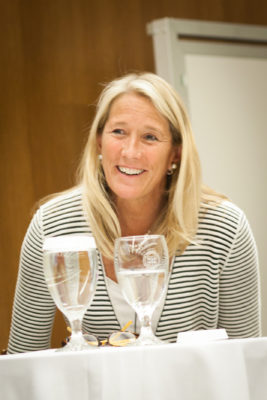In this video, Michelle Duguid, professor of organizational behavior, and Maxine Clark, founder and former CEO of Build-A-Bear Workshops, talk about the importance of mentorship for women in the workplace. These conversations are part of a four-part series on the course the two are co-teaching, Women & Leadership.
Clark: I think mentorship is really important. I think people think of it sometimes as a very static thing, like okay, I’m going to go ask somebody to be my mentor and then they’re going to be my mentor and they’re going to help me get to be successful. But it isn’t really like that. A mentorship relationship is really a give and take. And you can say, well I’m a young student, what can I give that person who’s older and more experienced? But there really is a lot that you can give.
It’s a very active relationship. It’s not something that is static, and it’s not something where you can just expect to be a sponge and not give anything in return. It won’t work that way. People that report directly to you are looking to you for an example. They are looking to you for guidance, and it may not always be some formal mentoring going on, there’s informal mentoring and you have to be aware of that. There’s just still not enough of us [women] that we’re still looked up to and still seen as an exception, which I wish wasn’t the case, but it actually gives us, you know, more chance to teach.
It’s a very active relationship. It’s not something that is static, and it’s not something where you can just expect to be a sponge and not give anything in return.
Duguid: The research is pretty clear on this. Women who have sponsors, people who have skin in the game for them that’ll put their reputation on the line saying, “Yeah, you know, this person is great. You should definitely have them on your team.” It is, for men and women, extremely important for the success of their careers, and like Maxine said, it is a give and take. It’s a relationship that has to be cultivated, and it needs to be cared for and always not in one direction. That’s one of the biggest things that I think that people need to know about mentorship and sponsorship relationships. One of the things with sponsorship is if someone puts their reputation on the line, and says, “This is the person you need,” you just need to do a really good job as well. That’s a big part of it.
Clark: It’s always flattering when somebody wants you to be their mentor, but you have to really help them realize, well, I’m glad to help you in any way I can. So, I think there’s lots of ways to mentor. Some are short term and some are longer term and lots of ways to get way more than you give in the process.
“I have had several mentors who have greatly influenced different aspects of my growth and learning in the past 20 years or so. My dean at Washington University, Dr Mahendra Gupta, former dean, Olin Business School, had a great influence on me during my early professional career.








 Kathy Button Bell, Chief Marketing Officer at Emerson is one of the executives who shares advice from mentors in a new e-book from Bizwomen, Mentors Across America. The book is
Kathy Button Bell, Chief Marketing Officer at Emerson is one of the executives who shares advice from mentors in a new e-book from Bizwomen, Mentors Across America. The book is 
 Kathy Osborn, Executive Director of the RBC, advised the audience to “find a company with a mission you can get behind.”
Kathy Osborn, Executive Director of the RBC, advised the audience to “find a company with a mission you can get behind.”